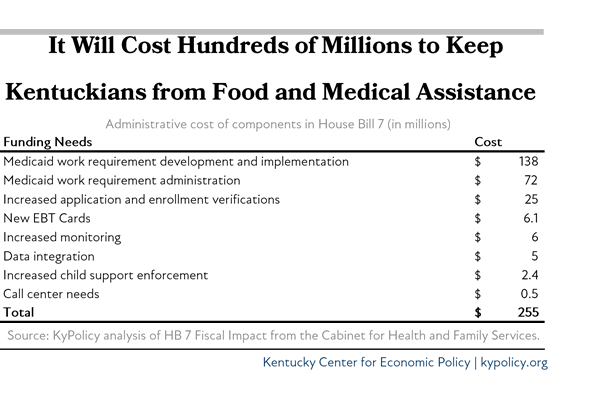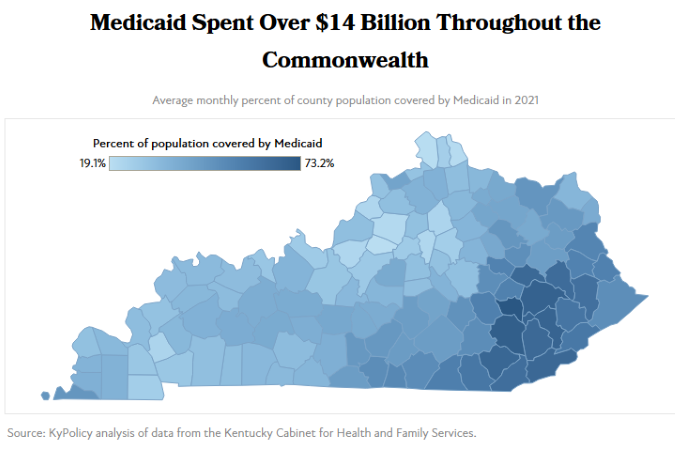House Bill 7 (HB 7) would introduce many new barriers to the Supplemental Nutrition Assistance Program (SNAP) and Medicaid, resulting in tens to hundreds of thousands of fewer Kentuckians receiving food and medical assistance, many of whom would remain eligible but get tripped up in complex new rules and requirements. This would be devastating for not only those Kentuckians and their families, but also the state’s budget and economy. A new estimate from the state’s Cabinet for Health and Family Services (CHFS) is that administering the bill’s complex changes will cost $255 million, burdening already overworked staff and taking money that could be invested in real needs.
In addition, SNAP and Medicaid pump nearly $16 billion in mostly federal funds into local economies throughout the commonwealth, stimulating additional activity and resulting in more spending and jobs. HB 7’s new barriers to food and medical assistance will significantly reduce the economic benefit of those programs, increasing hardship and leading to fewer jobs in economically distressed areas.
The administrative costs of creating and maintaining HB 7’s barriers would be extreme
All of HB 7’s new barriers and requirements come with a price tag. CHFS put together a fiscal impact estimate for many of them based on the introduced version of the bill. When adding up their estimates for only the parts that relate to the current version, the cost remains staggering — $255 million, mostly in ongoing costs. The largest share of that cost is related to the ill-fated Medicaid work reporting requirement, but another large portion of the cost comes from the need to double the CHFS casework staff. These costs would mostly have to come from the state General Fund, setting up a scenario where we spend hundreds of millions each year with state funds in order to prevent hundreds of millions per year in federal funds from coming to Kentucky, as described below.

HB 7 includes multiple barriers to SNAP that will reduce federal spending in Kentucky
To participate in SNAP, individuals must have net incomes below the poverty line, which is $27,750 for a family of 4, for example. There are no exceptions to that income limit. However, HB 7 adds several other conditions for eligibility on top of that: a work reporting requirement regardless of how bad the job market is in your county, the requirement that participants frequently and rapidly report any changes to their life (like income, household size, address changes, etc.) and a requirement that parents who are owed child support help locate the parent who owes it.
The Cabinet for Health and Family Services (CHFS) estimates that the cumulative effect of these new requirements and eligibility changes would lead to as much as $104 million less in SNAP benefits coming to the state each year. The United States Department of Agriculture (USDA), which administers SNAP, estimates that for every $1 billion spent on SNAP, $1.54 billion is generated in the broader economy and 13,560 jobs are supported. Last year, SNAP benefits spent on groceries were valued at $1.6 billion, with the impact of SNAP more pronounced in economically distressed areas. As the map below suggests, the harms of new barriers to SNAP will also be concentrated in these regions of the state.
HB 7 includes harmful barriers to Medicaid that will reduce federal spending in Kentucky
Currently, Kentuckians with low incomes who are pregnant, children, disabled and elderly Kentuckians can qualify for traditional Medicaid, and all adults who are at or below 138% of the federal poverty level (a little over $18,754 for an individual) can qualify for expanded Medicaid. HB 7 creates multiple ways Kentuckians could lose Medicaid coverage — like a provision that increases paperwork requirements with tight deadlines, an illegal work reporting requirement that was estimated to kick at least 100,000 people off Medicaid, and measures that could keep people from being covered in an emergency through state-provided, temporary “presumptive eligible” Medicaid.
If 100,000 people lost coverage from just the work reporting requirement, the state would receive approximately $630 million less in federal funds — harming patients, hospitals and local economies alike. But given the many, compounding provisions in HB 7, the number of Kentuckians losing access to Medicaid under the legislation, and the impact on the state’s economy, would likely be much higher. Medicaid is a joint state-federal program, where the federal government paid 81.3% of the cost of the program in 2021, or $11.5 billion of the $14.4 billion spent. Every dollar in spending through Medicaid yields between $1.35 and $1.80 in state economic activity, meaning fewer federal dollars coming in because of new state barriers to Medicaid will have a multiplied negative impact on the economy. As with SNAP, more economically distressed regions will be more negatively impacted by a reduction in Medicaid spending.
There are many reasons why the General Assembly should abandon HB 7. It will leave Kentuckians hungrier, sicker and struggling to gain economic security, harm our economy, and cost state resources that we could pump into child care, college affordability, and other foundations of thriving communities. Spending state money to undercut families’ financial security is both penny and pound foolish, and will have ripple effects throughout the state, costing us jobs and well-being at the same time.




